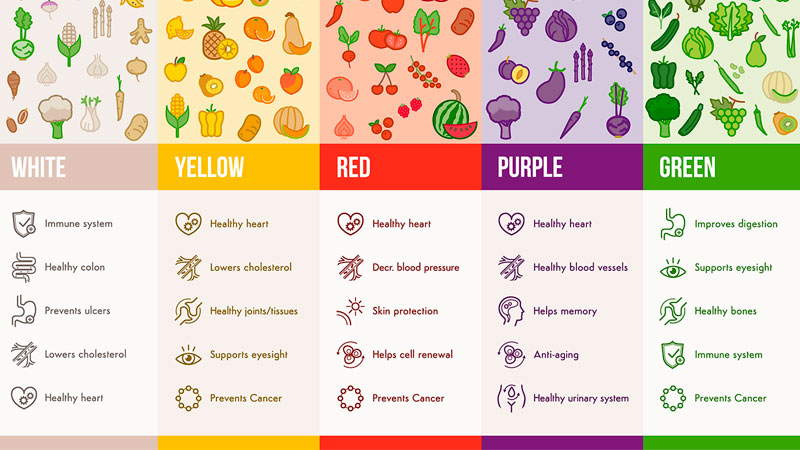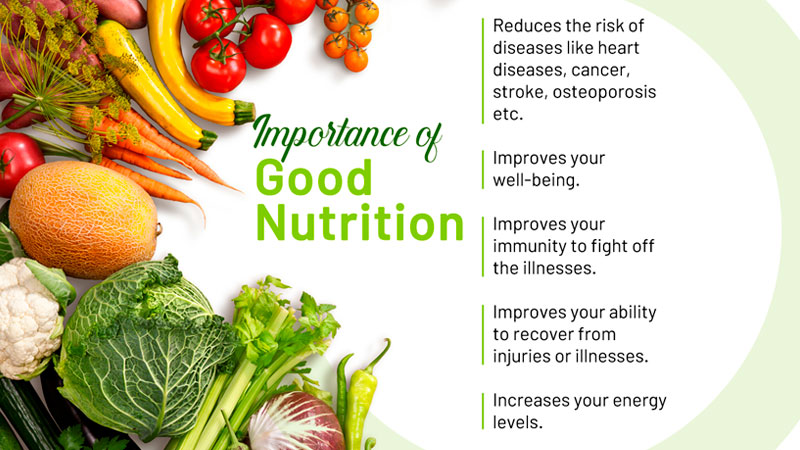Nutrition is one of the fundamental pillars of a healthy life. A balanced and varied diet is essential for keeping the body functioning properly and preventing disease.
Table of Contents
The importance of nutrition has been increasingly recognized by both health professionals and the general population.
Proper nutrition is important at all stages of life, from childhood to old age. A healthy diet helps prevent chronic diseases such as diabetes, hypertension and obesity, as well as improving physical and mental performance. A lack of essential nutrients can lead to health problems such as anemia, osteoporosis and malnutrition. That's why it's important to eat a balanced diet that includes all the food groups in adequate quantities.
The importance of nutrition
Nutrition is essential for maintaining a healthy life. It is through nutrition that the body obtains the nutrients it needs to function properly. A balanced and varied diet is essential to ensure adequate intake of vitamins, minerals, proteins, fats and carbohydrates.
A healthy diet can prevent a number of chronic diseases, such as diabetes, hypertension and obesity. It can also improve quality of life and increase longevity.
The benefits of a healthy diet are not just limited to the body. Nutrition can also affect brain function and mental health. Studies show that proper nutrition can improve mood, concentration and memory.
On the other hand, a diet poor in nutrients can lead to a range of health problems. Malnutrition can cause weakness, fatigue, anemia and even compromise the immune system.
In short, nutrition plays a fundamental role in maintaining health and well-being. It is important to have a balanced and varied diet that provides all the nutrients needed for the body to function properly.

Essential nutrients
Our body needs a variety of nutrients to function efficiently. These can be divided into macronutrients (proteins, carbohydrates and fats) and micronutrients (vitamins and minerals). Each one has specific functions that contribute to the proper functioning of our body systems.
- Proteins: essential for tissue growth and repair.
- Carbohydrates: provide quick energy and are vital for brain function.
- Fats: are a concentrated source of energy and are necessary for the absorption of fat-soluble vitamins such as A, D and K.
- Vitamins and minerals: essential for various chemical reactions and physiological processes, such as blood clotting and immune function.
Disease Prevention
A balanced diet, rich in essential nutrients, can help prevent various chronic diseases. For example:
- Cardiovascular Disease: Consuming foods rich in omega-3 fatty acids, such as fish and nuts, can help reduce the risk of heart disease.
- Diabetes: Eating fiber and controlling your intake of sugars and simple carbohydrates can regulate blood sugar levels.
- Cancer: Foods rich in antioxidants, such as fruit and vegetables, can help prevent some types of cancer.
Nutrition and Physical Health
Nutrition is fundamental to maintaining a healthy life and preventing chronic diseases. A balanced and healthy diet provides the body with the nutrients it needs to function properly, helping to maintain physical and mental health.
Chronic diseases
A diet rich in nutrients can help prevent chronic diseases such as diabetes, hypertension and obesity. Choosing healthy foods and maintaining a healthy weight can help reduce the risk of developing these diseases.
Some nutrients, such as vitamins C and E, selenium and carotenoids, have antioxidant properties that help protect the body against cell damage and inflammation, reducing the risk of chronic diseases.
Energy and vitality
A balanced and healthy diet can provide the energy and vitality needed for daily activities. Carbohydrates are the body's main source of energy, and a diet rich in complex carbohydrates, such as those found in whole grains, fruits and vegetables, can help keep energy levels stable throughout the day.
In addition, a diet rich in nutrients such as iron, magnesium and B vitamins can help prevent fatigue and increase vitality.
In short, a balanced and healthy diet is fundamental to maintaining physical health and preventing chronic diseases. Choosing healthy foods and maintaining a healthy weight can help reduce the risk of developing chronic diseases, while a diet rich in nutrients can provide the energy and vitality needed for daily activities.
Nutrition and Mental Health
Nutrition is an important factor in maintaining mental health. A balanced diet can help prevent and treat mental disorders, as well as improving general mental well-being.
Mental well-being
A healthy diet can help improve mental well-being. Foods rich in nutrients such as vitamins, minerals and antioxidants can help reduce stress and improve mood. In addition, a balanced diet can help prevent depression and anxiety.
On the other hand, a diet rich in sugars and saturated fats can have a negative effect on mental health. Excessive consumption of these foods can lead to mood swings and increase the risk of depression.
Brain function
Nutrition also plays an important role in brain function. Some nutrients, such as omega-3 fatty acids and B vitamins, are essential for brain health and can help improve memory and concentration.
In addition, a balanced diet can help prevent brain diseases such as Alzheimer's. Some studies show that a diet rich in fruit, vegetables and whole grains can help reduce the risk of developing this disease.
In short, a balanced diet is essential for mental and brain health. Consuming nutrient-rich foods and avoiding processed and sugary foods can help improve mental well-being and prevent brain diseases.

Nutrition and Longevity
A healthy and balanced diet is essential for a long and healthy life. Proper nutrition can help prevent chronic diseases and improve quality of life.
There are many important nutrients that should be included in the daily diet, such as proteins, carbohydrates, healthy fats, vitamins and minerals. Each nutrient plays an important role in the functioning of the body and should be consumed in adequate quantities.
A lack of essential nutrients can lead to various diseases, such as osteoporosis, anemia and diabetes. On the other hand, excessive consumption of processed foods rich in sugar, fat and salt can lead to cardiovascular disease, obesity and other chronic illnesses.
It is therefore important to follow a balanced and varied diet, which includes nutrient-rich foods and avoids processed foods and added sugars. In addition, it is important to maintain a healthy lifestyle, including regular exercise and avoiding tobacco and alcohol in excess.
The Importance of a Balanced Diet
A balanced diet is essential for maintaining a healthy life and preventing illness. Eating nutritious foods and staying properly hydrated are fundamental to ensuring that the body functions properly.
Nutritious foods
Nutritious foods are those that provide essential nutrients for the body, such as vitamins, minerals, proteins and carbohydrates. A balanced diet should include a variety of foods, such as fruit, vegetables, whole grains, lean proteins and healthy fats.
To ensure an adequate intake of nutrients, it is important to choose foods from different food groups. For example, a balanced meal might include a portion of lean protein, such as chicken or fish, a portion of complex carbohydrates, such as brown rice or quinoa, and a portion of vegetables, such as broccoli or carrots.
Hydration
Adequate hydration is essential to keep the body functioning properly. Water is essential for maintaining body temperature, transporting nutrients and eliminating waste.
To maintain adequate hydration, it is important to drink water regularly throughout the day. In addition, other drinks, such as tea and natural juice, can contribute to hydration. However, it is important to avoid sugary drinks and those with a high caffeine content, such as soft drinks and coffee, as they can have negative effects on health.
A balanced diet and adequate hydration are key to maintaining a healthy life. By choosing nutritious foods and drinking water regularly, you can ensure that your body functions properly and prevent illness.
Challenges in Maintaining Adequate Nutrition

Maintaining proper nutrition can be a challenge for many people. Some of the main reasons why people struggle to maintain a healthy diet include lack of time, lack of knowledge about proper nutrition and lack of access to healthy foods.
For many people, lack of time is one of the main obstacles to maintaining a healthy diet. With busy schedules, it can be difficult to find the time to prepare healthy, balanced meals. This can lead to a reliance on processed foods and fast food, which are often high in fat, sugar and salt.
Another common challenge is a lack of knowledge about proper nutrition. Many people don't know which foods are healthy and which should be avoided. This can lead to poor food choices and a lack of essential nutrients in their diet.
Finally, for some people, a lack of access to healthy food can be a major obstacle to maintaining a healthy diet. In some areas, it can be difficult to find affordable fruit, vegetables and other healthy foods. This can lead to a reliance on processed foods and fast food, which are generally cheaper and easier to find.
Conclusion: Importance of Nutrition for a Healthy Life
We all agree that nutrition is fundamental for a healthy and balanced life. It is important to eat a varied and balanced diet that includes all the food groups in adequate quantities. In addition, it is important to be aware of the nutritional needs of each individual, as each person has different needs according to their age, gender, level of physical activity and state of health.
Nutrition also plays a fundamental role in the prevention and treatment of various diseases, including obesity, diabetes, cardiovascular diseases, among others. It is therefore essential that people are aware of the importance of a healthy diet and seek guidance from nutrition professionals in order to achieve their goals.
Finally, it is important to emphasize that nutrition is not just a temporary diet for weight loss, but a healthy lifestyle that must be maintained over the long term. With proper and balanced eating habits, you can lead a healthier and happier life.
Eat well, live better!




